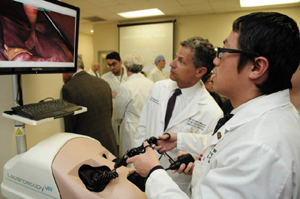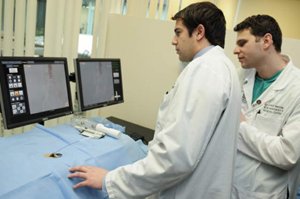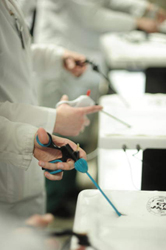

 |
 |
SURGICAL SIMULATION TRAINING

![]() Simulation training became a part of the educational curriculum for all our surgical residents in 2008. The first surgical simulation training schedule included a few modules from the American College of Surgeons (ACS) Phase I curriculum and a small number of clinical scenarios with immediate debriefing and feedback from surgical faculty.
As this effort was embraced by all residents and faculty and the curriculum expanded with the addition of new modules, the need for establishing an effective in-house facility to support simulation education became clearly evident.
Simulation training became a part of the educational curriculum for all our surgical residents in 2008. The first surgical simulation training schedule included a few modules from the American College of Surgeons (ACS) Phase I curriculum and a small number of clinical scenarios with immediate debriefing and feedback from surgical faculty.
As this effort was embraced by all residents and faculty and the curriculum expanded with the addition of new modules, the need for establishing an effective in-house facility to support simulation education became clearly evident.
Our Surgical Skills Center (SSC), under the direction of Apostolos K. Tassiopoulos, MD, was inaugurated in January 2011 to provide a leading-edge training experience for all surgery residents. The SSC is an 1800-square-foot facility located at the heart of Stony Brook University Hospital, in close proximity to clinical care areas and operating room suites, providing an ideal environment for advanced surgical education.
Accessible 24/7 (via ID card access) to all residents and faculty, the SSC provides opportunities to practice in a stress-free environment not only surgical technical skills, but also pre- and post-operative patient care scenarios that enhance residents' educational experience.

![]() Currently available training modules range from basic open skills (knot tying, suturing, intravenous access, central line and chest tube insertion) and fundamental laparoscopic skills (camera navigation, controlled cutting, transfer drills, laparoscopic suturing) to advanced open surgical skills (inguinal hernia anatomy and repair, sutured and stapled intestinal anastomosis, vascular anastomosis, arterial endarterectomy and bypass, open aortic aneurysm repair) and advanced patient care skills (advanced trauma and cardiac life support, various surgical clinical care scenarios).
Currently available training modules range from basic open skills (knot tying, suturing, intravenous access, central line and chest tube insertion) and fundamental laparoscopic skills (camera navigation, controlled cutting, transfer drills, laparoscopic suturing) to advanced open surgical skills (inguinal hernia anatomy and repair, sutured and stapled intestinal anastomosis, vascular anastomosis, arterial endarterectomy and bypass, open aortic aneurysm repair) and advanced patient care skills (advanced trauma and cardiac life support, various surgical clinical care scenarios).
Three high-end haptic virtual reality simulators are also available for training in laparoscopic advanced skills, laparoscopic cholecystectomy, laparoscopic colon resection, angiographic vascular anatomy, and a wide array of basic and advanced endovascular skills (navigation of endovascular catheters, angioplasty, stenting).
A dedicated space for a surgical wet-lab has also been created to allow for practice using animal tissue. The SSC utilizes cutting-edge audio/video technologies and software in order to maximize the utility and productivity of the activities it hosts, and to provide opportunities for performance review of, effective debriefing with, and meaningful feedback to trainees.

![]() Residents are provided with protected time each Thursday morning to participate in simulation exercises. Moreover, for two months at the beginning of the academic year, surgical residents participate in weekly "boot camp" activities, organized by training level, that are facilitated at the SSC and are designed to provide a solid foundation for developing all core competencies established by the Accreditation Council for Graduate Medical Education.
Residents are provided with protected time each Thursday morning to participate in simulation exercises. Moreover, for two months at the beginning of the academic year, surgical residents participate in weekly "boot camp" activities, organized by training level, that are facilitated at the SSC and are designed to provide a solid foundation for developing all core competencies established by the Accreditation Council for Graduate Medical Education.
This two-month surgical boot camp is particularly effective in providing incoming interns with a background in basic surgical skills, while giving more senior residents the opportunity to refresh previously acquired skills and gain, through simulation, an introduction to more advanced techniques, procedures, and protocols.
As our residents have found great value in participating in these boot camp sessions, the Department's Education Division is currently working on expanding training modules to procedural simulation and teams training, such that our simulation training program incorporates all three phases of the ACS curriculum organized by PGY training level.
Surgical simulation has emerged as a training tool with enormous potential for teaching, learning, and research. Our SSC provides residents and medical students the opportunity to be a part of this rich, dynamic process, and to work collaboratively in making meaningful contributions to the field of surgical simulation education (eg, "Simulated Laparoscopic Sigmoidectomy Training: Responsiveness of Surgery Residents").

| Return to Department of Surgery | Return to Residency Program |